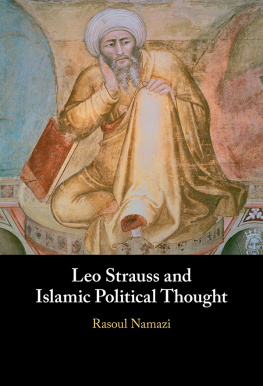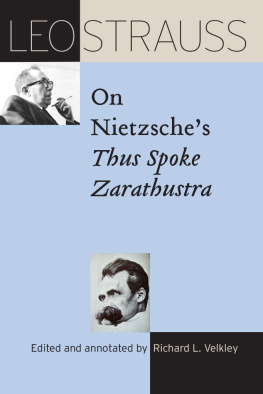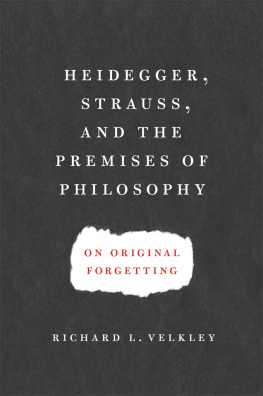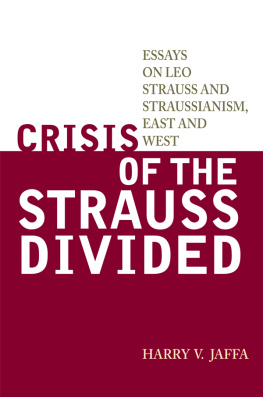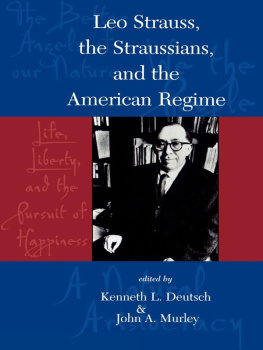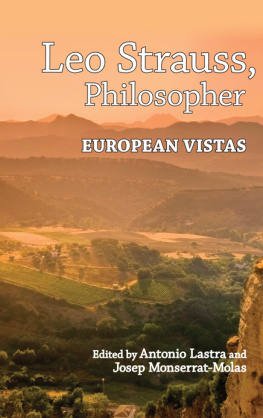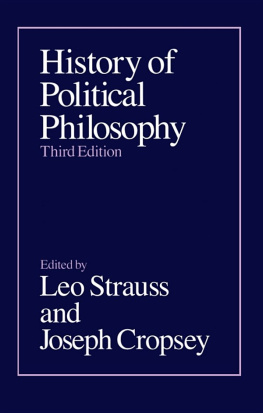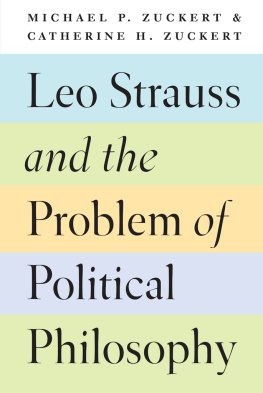
Contents
Leo Strauss and Islamic Political Thought
In this book, Rasoul Namazi offers the first in-depth study of Leo Strausss writings on Islamic political thought, a topic that interested Strauss over the course of his career. Namazis volume focuses on several important studies by Strauss on Islamic thought. He critically analyzes Strausss notes on Averroess commentary on Platos Republic and proposes an interpretation of Strausss theologico-political notes on the Arabian Nights . Namazi also interprets Strausss essay on Alfarabis enigmatic treatise The Philosophy of Plato and provides a detailed commentary on his complex essay devoted to Alfarabis summary of Platos Laws. Based on previously unpublished material from Strausss papers, Namazis volume provides new insights into Strausss reflections on religion, philosophy, and politics and their relationship to wisdom, persecution, divine law, and unbelief in the works of key Muslim thinkers. This work presents Strauss as one of the most innovative historians and scholars of Islamic thought of all time.
Rasoul Namazi is an assistant professor of political theory at Duke Kunshan University, China and assistant professor of the practice of global studies at Duke University, USA. A laureate of the Raymond Aron Prize, he has held fellowships from the Committee on Social Thought, University of Chicago, and the Alexander von Humboldt Stiftung, Ludwig Maximilian University of Munich. He is the author of articles and chapters on Islamic and Western political thought published in the Journal of Religion , Perspectives on Political Science , American Political Thought , Iranian Studies , Interpretation , Review of Politics, Renaissance & Reformation , and Eurorient as well as in collected volumes.
Leo Strauss and Islamic Political Thought
Rasoul Namazi
Duke Kunshan University

University Printing House, Cambridge CB2 8BS, United Kingdom
One Liberty Plaza, 20th Floor, New York, NY 10006, USA
477 Williamstown Road, Port Melbourne, VIC 3207, Australia
314321, 3rd Floor, Plot 3, Splendor Forum, Jasola District Centre, New Delhi 110025, India
103 Penang Road, #0506/07, Visioncrest Commercial, Singapore 238467
Cambridge University Press is part of the University of Cambridge.
It furthers the Universitys mission by disseminating knowledge in the pursuit of education, learning, and research at the highest international levels of excellence.
www.cambridge.org
Information on this title: www.cambridge.org/9781009098700
DOI: 10.1017/9781009105118
Cambridge University Press 2022
This publication is in copyright. Subject to statutory exception and to the provisions of relevant collective licensing agreements, no reproduction of any part may take place without the written permission of Cambridge University Press.
First published 2022
A catalogue record for this publication is available from the British Library .
Library of Congress Cataloging-in-Publication Data
NAMES: Namazi, Rasoul, 1982 author.
TITLE: Leo Strauss and Islamic political thought / Rasoul Namazi.
DESCRIPTION: 1. | New York : Cambridge University Press, 2022. | Includes bibliographical references and index.
IDENTIFIERS: LCCN 2021059222 (print) | LCCN 2021059223 (ebook) | ISBN 9781009098700 (hardback) | ISBN 9781009105118 (ebook)
SUBJECTS: LCSH: Islamic philosophy Greek influences. | Strauss, Leo Political and social views. | Frb Criticism and interpretation. | Averros, 11261198 Criticism and interpretation.
CLASSIFICATION: LCC B744.3 .N36 2022 (print) | LCC B744.3 (ebook) | DDC 181/.07dc23/eng/20211207
LC record available at https://lccn.loc.gov/2021059222
LC ebook record available at https://lccn.loc.gov/2021059223
ISBN 978-1-009-09870-0 Hardback
Cambridge University Press has no responsibility for the persistence or accuracy of URLs for external or third-party internet websites referred to in this publication and does not guarantee that any content on such websites is, or will remain, accurate or appropriate.
To Heinrich Meier
I have read that in some Italian pictures Plato is represented holding in his hand the Timaeus and Aristotle his Ethics . If a pupil of Maimonides or of the Islamic philosophers had found pleasure in representations of this kind, he might have chosen rather the inverse order: Aristotle with his Physics or Metaphysics and Plato with his Republic or Laws .
Leo Strauss
Preface
In recent years, there has been a considerable increase of interest in the thought and writings of Leo Strauss, now recognized as one of the most influential and controversial thinkers of his generation. A rising awareness of the importance of Strausss commentaries on a variety of authors can be observed: his contributions to the study of the history of ancient and modern political thought, as well as Jewish figures, are generally recognized as being worthy of discussion and are debated even by those who have serious reservations about Strausss claims and general perspective. Strausss studies on medieval Islamic political philosophy, however, have received a rather limited response from scholars of Islamic political thought: many studies on Islamic thought are written in complete disregard of Strausss scholarship on the subject. Those few writings that discuss Strausss ideas, on the other hand, range from brief and very dismissive comments to a few critical but interesting discussions, a few sympathetic short but valuable essays, and detailed studies that are intellectually very rich and informative but which focus on aspects of Strausss intellectual production other than Islamic political thought proper. This limited reception of Strausss contribution to the study of Muslim philosophers is not consonant with the unique position medieval Islamic political thought occupies in Strausss intellectual biography. It was because of the discoveries Strauss made while studying medieval Islamic philosophy that he was guided toward classical Greek philosophy: his studies on Maimonides pointed him back toward Alfarabi, and through Alfarabi Strauss was guided back toward Plato, as well as to a new understanding of Jewish thinkers. It is therefore not surprising that Strauss once called Arabic
This volume tries to fill this gap in the literature by focusing on this aspect of Strausss thought in a comprehensive fashion. The result will not only reveal a better understanding of the role played by Islamic political thought in Strausss writings but also introduce the unique perspective of one of the most original historians of philosophy on Islamic thought. There is much talk in academia about the need to open the discipline of philosophy to non-Western thinkers, such as Islamic philosophers. One of the prerequisites for such inclusion would be to treat the writings of these thinkers not only as objects of historical study but also as works still relevant to contemporary philosophical and politico-religious debates. Strauss was among those who entered into dialogue with the writings of Islamic figures as products of remarkable thinkers addressing universal questions. His writings can therefore help us in furthering the inclusion of these works in the discipline of philosophy and treating them with the seriousness they require.

